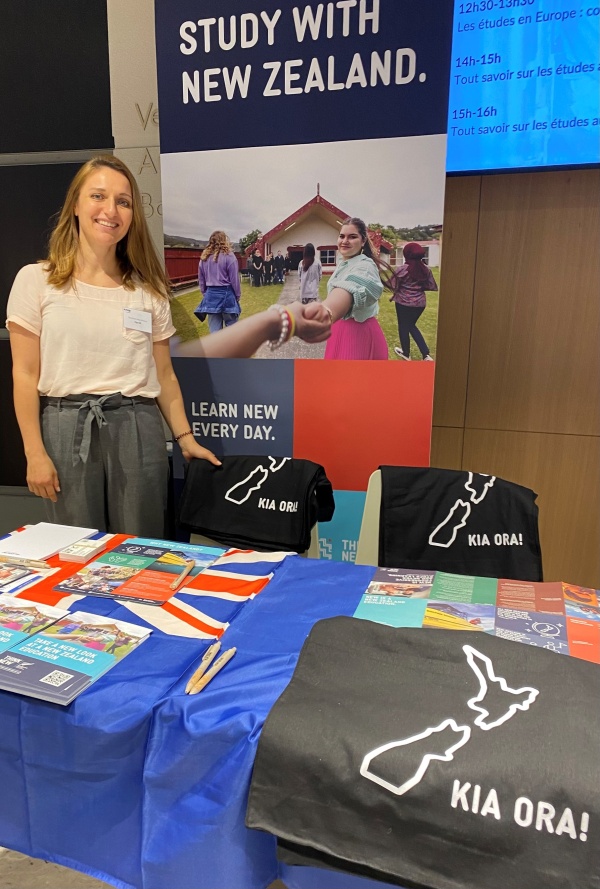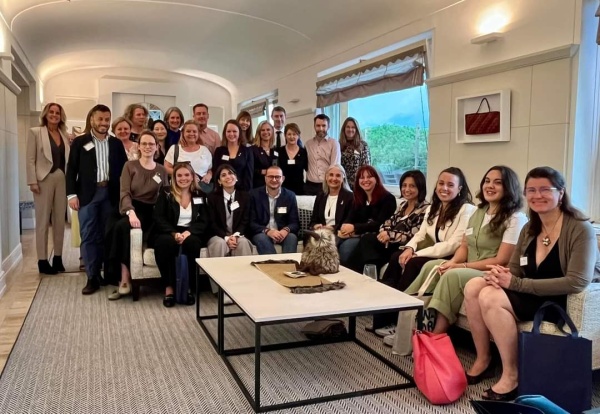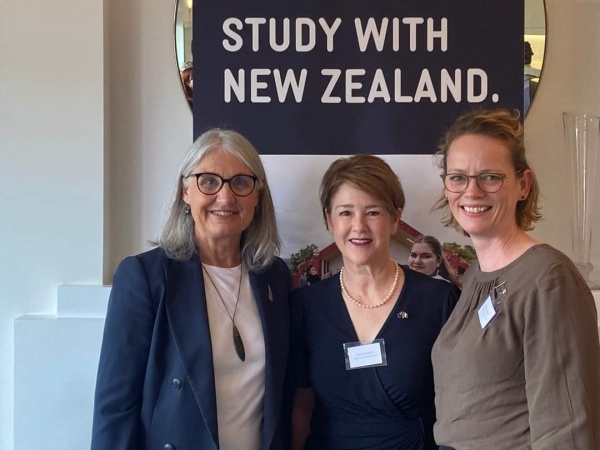Search
Showing 10 of 2157 results for read 2024 FRM Exam Part I - Quantitative Analysis online free
-
Advertising opportunity for Japan’s New Zealand Study Guidebook
The publication is the only one of its kind supported by the New Zealand Embassy in Tokyo and Education New Zealand Manapou ki te Ao (ENZ). KBUNSHA distributes 20,000 copies to Japanese schools, universities and education organisations as well as education fairs and seminars.
ENZ’s Business Development Manager – Japan, Tomomi Kontani said that there is increased demand for information on New Zealand’s education offering.
“We are continuing to see significant interest in New Zealand as an education destination from students and their parents, schools, and education agents here in Japan.
“The KBUNSHA New Zealand Study Guidebook is a trusted publication in Japan and advertising here is a great opportunity for education providers and regions to promote New Zealand education to the Japanese public. Destination marketing plays a key role in student attraction for a market like Japan with a tourism focus and we hope regions can also participate in this special opportunity to introduce their regions and activities”, said Tomomi.
This guidebook was distributed at the annual student fair and education stakeholder events hosted by ENZ Japan in 2023 which attracted over 1,000 people. The New Zealand Study Guidebook will remain the main information source referred to and distributed at upcoming education events in Japan. ENZ encourages NZ providers attending the New Zealand Fair in Tokyo October 2024 to consider advertising in the Study Guidebook to reach your target audience in Japan.
Advertisement rates for individual providers range from approx. NZD 2,500 to NZD 6,020 for guidebook and/or website listings. With the “Premier Plan” and “Advertorial Plan”, the school logo will be listed on the new scholarship campaign page built by KBUNSHA. Individual providers can download the proposal here. Advertising copy can be provided in English.
For regional groups, download the proposal here for further details on the guidebook and pricing (approx. NZD 2,200 for a 2-page colour advertisement and NZD 3,300 for a 4-page colour advertisement).
Bookings must be made by 28 June 2024. For more information, visit the KBUNSHA website here. You can view last year’s guidebook here.
Alternatively, interested New Zealand education providers and regional groups can contact KBUNSHA for any questions (available in English).
KBUNSHA contact:
Minori Takahashi (Director)
Tel: +81-3-3234-1744
Email: minori@kbunsha.com
-
Opportunity for New Zealand and German academics to collaborate
The third funding round for the Programmes for Project-Related Personal Exchange (PPP) programme is open now. The programme supports early-career academics from New Zealand higher education institutions to travel to Germany and engage in research projects.
The PPP programme was established in 2021, when ENZ and the German Academic Exchange Service (DAAD) signed a Memorandum of Understanding.
Amy Rutherford, Regional Director Americas, the Middle East and Europe said the programme aims to strengthen academic relations between New Zealand and German institutions and to promote cooperative and complementary research activities.
“It enables young academics to not only further their careers, but also expand New Zealand’s international research links” she said.
The programme aims to fund group exchanges involving two to four researchers per country and covers all subject areas. It invites researchers to think of a project that would particularly benefit from working with German academic counterparts.
University of Otago Professor Chris Button is a recipient of PPP funding from the 2023 round and is working with Dr Robert Rein from the German Sport University in Cologne.
They are undertaking research that aims to provide evidence-based advice on how to promote water safety and prevent drowning.
Chris and his counterpart identified that drowning is a major cause of accidental deaths worldwide and is noted as one of the key challenges in the United Nation’s commitment to achieve global, economic, social and environmentally sustainable development.
The pair have observed a gap in academic literature about the potential benefits of floating, versus treading water or swimming when someone is in trouble in the water. They have collected a series of samples from 200 participants in New Zealand and will publish their findings soon.
Chris said he’s grateful that the PPP programme has helped him reinvigorate a long-standing collaboration with Robert.
“I encourage others to take the opportunities this programme offers to connect New Zealand and German academics” he added.
Applications for the 2024 funding round close on 28 June 2024, click here to find out more and apply.
-
Tune in to hear about the FY 2023 student enrolment data
The full year 2013 – 2023 international student enrolment data provided by the Ministry of Education is now available on ENZ’s Tableau Public site. Anyone can access this data and filters which is presented in interactive downloadable dashboards and data tables. ENZ’s media release on the data can be found on our website here.
Marie Clark, ENZ’s Director Insights will be running two sessions for anyone interested in learning more about these numbers. You will hear insights including how subsectors have grown, how recovery has been distributed and our top source countries for total international student enrolments and variation by subsector.
You can register for the webinar which best works for your time zone via the links below. Recordings will also be made available on Intellilab after the sessions.
-
Thursday 25 July 2024 – 8am NZT - https://enz.zoom.us/webinar/register/WN_-VZ_JKXIQh6PhmNNPNRVUw
-
Thursday 25 July 2024 – 7pm NZT - https://enz.zoom.us/webinar/register/WN_dUfHYlP5TzSpCVDJ2cWBdg
If you have anything that you would like covered, please get in touch via insights@enz.govt.nz
-
-
Find out more about what international students think about their NZ experience
Director of Insights for Education New Zealand Manapou ki te Ao (ENZ), Marie Clark, and Student Experience Manager, Ross Crosson will be hosting a webinar on 22 August 2024 from 7-8pm NZST on the recently released 2024 Student Experience Survey results. The webinar is for anyone in our sector who is interested in delving more into the data.
Marie and Ross will talk about the overall student experience for international students enrolled with a New Zealand education provider and where improvements can be made to enhance the international student experience.
You can register via the following link: https://enz.zoom.us/s/81600505051
If you can't make the live session, a recording will be available on Intellilab from Friday.
ENZ’s media release which includes links to the report and data sets can be found on our website - Rise in international students rating New Zealand experience positively » Education NZ (enz.govt.nz) .
-
Discount for AIEC 2024 Melbourne – E-News special!
AIEC 2024 are offering New Zealand delegates a special rate for their upcoming conference in Melbourne from 22 to 25 October. This year’s theme, ‘the human element’, invites educators, researchers, policymakers and thought leaders to explore the multifaceted dimensions of human interactions across the international education landscape in this rapidly evolving digital era.
In amongst an action-packed programme, there are several New Zealand speakers presenting this year on topics relevant to New Zealand delegates that include:
-
Brett Berquist from the University of Canterbury will speak in the session on: Diversifying Asian student cohorts: navigating constraints and maximising opportunities
-
Hayley Shields from Edified NZ will be presenting in the session on: Expectations versus reality: insights into the international student journey
-
Catherine Dunphy, Martin Hookham-Simms, from the University of Auckland, and Hayley Shields, Edified NZ are speaking in the session on: Designing an internationalisation framework through Indigenous values
-
Monique van Veen and Elizabeth Zou, from the University of Canterbury will speak about: Engaging with the next generation: surprised and inspired by them
Anyone registering by the 30th of September will lock in the early bird rate (a saving of $150 off the standard rate).
Use code ENZ150@AIEC24 at the checkout to receive the rate. This is limited to the first 50 registrants and is applicable to Non-Client/Member Standard rate only.
Find out more, including the full programme of keynotes, workshops, sessions, plus social events and exhibition activations on AIEC's event website here - Australian International Education Conference | AIEC (idp.com)
-
-
Update from Immigration New Zealand
Peak processing season in full swing
Immigration New Zealand (INZ) has seen an increase in applications submitted during September 2024, ahead of the 1 October visa fee and levy increase and because of our ‘apply early’ messaging.
In September 2023, approximately 3,104 international student visa applications were submitted and in September 2024, approximately 6,893 international student visa applications have been submitted, an increase of 122%.
Now that we are in our peak processing period, we expect these processing times to grow as we receive a higher volume of applications. Students should get their visa application in at least 3 months before they plan to travel to New Zealand for the first semester of 2025.
By now, most students should have received an offer of place from their chosen education provider. Anyone expecting to study in the first term of 2025 should apply now.
We acknowledge that some students who are waiting on key study documentation are unable to apply 3 months ahead. In these cases, they should apply as soon as they have all of their documents, but they need to be aware that late applications may not be processed in time for them to start studying.
Immigration New Zealand has three student processing sites in New Zealand, and has allocated more staff to processing student visas, compared to last year’s peak.
Ensure you submit a complete applicationTo avoid delays, we encourage students, agents and advisers to follow the advice in our student visa information sheets. If they do not include all the required documents when they submit their application, it may be declined.
Applications that have a statement of purpose letter written by the student, telling us about their personal circumstances and plans in New Zealand, help us assess their intent. If a student intends to apply for another visa after study, they should declare this. Students are allowed to apply for another visa after they finish studying.
-
A flurry of international education events in Europe
September is often a busy time in the world of international education in Europe. To make the most of the time when students are gathering information to support their study-abroad decision-making, the Education New Zealand Manapou ki te Ao (ENZ) European-based team were making their presence felt at various events to support the school and tertiary subsectors grow their European connections and relationships.
This year’s 34th European Association for International Education Conference (EAIE) was held in Toulouse, France and saw a record number of 7,300 delegates from all around the world attend. The New Zealand pavilion had a strong presence with seven of our universities joining the ENZ booth.

Networking in action at the New Zealand pavilion at EAIE 2024 in Toulouse, France.
ENZ’s Associate Director of Engagement in Europe, Olga Elli, said that these conferences are a fantastic opportunity to showcase New Zealand’s expertise and offerings on a global stage.
“These conferences are a place where relationships are started and nurtured. They result in meaningful partnerships, exchanges and projects for the New Zealand international higher education sector.
“They are also an opportunity to showcase the manaakitanga that New Zealand is famous for. We hosted a get-together at the New Zealand pavilion providing New Zealand wine and French cheese, the perfect match to share with our trusted partners in Europe.,” said Olga.

The New Zealand Pavilion at EAIE 2024 plays host to guests with New Zealand wine and French cheese.
While in France, Olga also attended the student recruitment fair, Elevate, in Paris. This was organised by Study Experience, a Paris-based agency. With nearly 800 French students studying across all sectors in 2023, France is the second largest European country sending students to New Zealand. This trend looks set to continue with plenty of interest in the New Zealand stand at the fair, particularly for students looking for full-degree study programmes.

ENZ’s Associate Director of Engagement, Olga Elli, on the New Zealand Stand at the Elevate student recruitment fair in Paris.
After Germany, Italy represents the second largest source of high school students from Europe and in 2023, New Zealand welcomed 227 Italian high school students to our shores. Growing this market and supporting agents to promote New Zealand is therefore a priority for ENZ.
To support this growth, several New Zealand high school representatives and Italian agents were given the opportunity to meet at the New Zealand Embassy in Rome in September. This was a chance to come together, connect and identify opportunities to work together going forward.

New Zealand high school representatives and Italian education agents come together at the New Zealand Embassy in Rome.
The event was initiated by Terry Kraettli, Director International of Epsom Grammar School, with support from ENZ and the New Zealand Ambassador to Italy, Jackie Frizelle.

ENZ’s Market Development Manager for Europe, Adina Stoye (right) with New Zealand Ambassador to Italy, Jackie Frizelle (left) and Terry Kraettli, Director International of Epsom Girls Grammar School (centre).
ENZ’s Market Development Manager Europe, Adina Stoye, said that it was encouraging to see such a strong interest in New Zealand high schools.
“ENZ will be supporting several more initiatives in the coming months to build on this momentum and further grow the Italian market,” added Adina.
If you have any questions about these markets, please contact Adina or Olga – europe@enz.govt.nz
-
ENZ Insights Webinar: New Zealander's Perceptions of International Students, 2024 Results Wednesday 20 November, 12:00-12:45
Education New Zealand Manapou ki te Ao has been monitoring New Zealander’s perceptions of international students since 2016.
A thriving and sustainable international education sector needs the support and buy-in of New Zealanders. Join this webinar with Marie Clark, Director Insights, to hear the results of the November 2024 edition of the survey.
You will hear:
-
The issues of most importance to New Zealanders
-
Perceptions about New Zealand’s economy and what things are most important to improve it
-
Perceptions of the social, cultural, and economic benefits of international education/students
-
Perceptions about the number of international students in New Zealand
If you would like to attend this webinar, please register via this page - Microsoft Virtual Events Powered by Teams.
This session will be recorded, and the slides and recording made available on Intellilab following the webinar.
-
-
Helping education agents understand the NCEA qualification and the pathways it opens to higher study
Education New Zealand and the New Zealand Qualifications Authority (NZQA) collaborated to organise a webinar for education agents in December on the National Certificates of Educational Achievement (NCEA), New Zealand’s school-leaver qualification.
The webinar was well received, with 241 attendees, and featured a robust question and answer session at the end.
The session helped education agents – and by extension the international students they support – in better understanding how NCEA works, the changes introduced to the qualification in recent years, and how learners can access higher education in New Zealand and internationally after achieving the NCEA qualification.
NZQA Deputy Chief Executive - Assessment, Jann Marshall, said the webinar was a valuable opportunity to build understanding of how the NCEA qualification works.
“It is important for everyone working with international secondary learners to have some understanding of how NCEA works, and the opportunities it creates for learners wanting to continue their study in New Zealand or internationally.
“It was great that we could engage with education agents on the topic and answer questions.”
NCEA is a well-recognised qualification in many countries. New Zealand is also a signatory to UNESCO qualifications recognition conventions (for example, Lisbon, Tokyo and Global Conventions), which support learners with NCEA to work or study internationally.
About NCEA
NCEA is offered at three levels – Level 1 is usually attempted by students in Year 11 of schooling, Level 2 at Year 12, and Level 3 at Year 13 (the final year of New Zealand secondary school). NCEA Level 2 is generally the minimum qualification needed for some jobs and tertiary education programmes, while Level 3, with the University Entrance award, is the minimum standard for entrance into a New Zealand university.
NCEA is standards-based, meaning each learner needs to show they have skills and knowledge at a specified level (a “standard”). Each standard a learner achieves gains them credits, and credits build toward an NCEA qualification.
Learners are also required to meet minimum requirements for literacy and numeracy. There are multiple opportunities in each school year for learners to attempt specific literacy and numeracy assessments, and there is also a list of other standards that can be used towards these requirements.
A recording of the webinar is available to view here on the Resources section of AgentLab
NCEA resources for education agents, students and parents
If you have any questions about NCEA, contact internationalunit@nzqa.govt.nz.
-
New Zealand and international secondary students to grow cultural competence skills together
Qualitative research[1] from ENZ concluded that New Zealand businesses who employed staff with cross-cultural competencies found this contributed to a more energising workplace, which helped to foster creativity and innovation as well as other benefits.
The employers agreed cross-cultural competence was a sought-after skill when hiring staff, leading ENZ to fund the programme for more high school students around the country.
Grant McPherson, Education New Zealand’s Chief Executive says, “The insights from New Zealand businesses around the benefits of cross-cultural competencies within their teams have been one of the key reasons we’ve taken this initiative to help grow cultural competency, providing an alternative to international school exchange experience while borders are closed.”
This work supports the third goal of the New Zealand International Education Strategy 2018-2030 to develop global citizens within New Zealand and aims to help both students and teachers develop their cross-cultural skills together with their global peers.
ENZ and Massey University first partnered with the American Field Service (AFS) in July 2020 to launch a pilot of the NZGCC programme. The virtual programme delivers animated videos, quizzes, assignments and weekly live facilitated dialogue sessions for local and offshore learners to talk with each other online in real time.
Following the success of the pilot, ENZ today announced a further $380,000 investment to subsidise the cost for 321 New Zealand and 486 international learners to develop cultural self-awareness, empathy for other cultures, emotional resilience and ways to build bridges in multicultural settings.
18 online modules cover topics such as stereotypes, empathy, dealing with conflict and resilience, and will be delivered to international learners from India, China, Japan, Vietnam, Thailand, the Republic of Korea, Indonesia, Brazil, Mexico, Colombia, Peru and Chile.
The newest students to benefit from the NZGCC programme are Whanganui Girls College, Cullinane College, Whanganui High School and Awatapu College pupils. Starting today, 23 Whanganui and Manawatu students will partake in a virtual learning exchange with 20 high school students in Tokyo, Japan, in a partnership with the Tokyo Board of Education.
Whanganui Girls College principal Sharon Steer says the new programme will help students build their understanding of global cultures – critical ‘soft’ skills that will also prepare them for life after high school as they enter the workforce.
“An important part of our curriculum is developing strong communication skills and setting our students up for success in the workplace. The NZGCC programme will add another dimension to our lessons by teaching our students how to develop meaningful relationships with one another despite language and cultural differences,” said Steer.
“This allows our students to connect with peers in Japan and learn more about their culture without having to get on a plane when international travel remains limited.”
In addition to secondary school students, the NZGCC programme will support teachers in indigenous communities in Pacific Alliance countries, and people undertaking English language and teacher training in Indonesia, Vietnam and the Republic of Korea.
Around 100 students from decile 1 to 5 schools across New Zealand will be offered NZGCC scholarships to participate in a virtual exchange with their peers in Asia.
ENZ’s Chief Executive Grant McPherson said the programme’s expansion is a key part of diversifying education in new virtual forms fit for a globally connected world.
“We’re pleased to continue our support for the NZGCC programme to bring New Zealand and international learners together in a virtual environment to gain the skills needed to live, work and learn globally.
“As well as helping to develop the global citizens of tomorrow, this programme demonstrates the reciprocal benefits of international education, giving our rangatahi a chance to learn with high school students from around the world, and giving their offshore peers a chance to learn ‘with’ New Zealand and our unique way of thinking.”
More information about the NZGCC can be found here: https://www.globalup.com/
ENDS
[1] https://intellilab.enz.govt.nz/document/583-employer-perceptions-of-hiring-international-graduates
Notes to editor:
- Education New Zealand is the government agency responsible for building international education to benefit New Zealand socially, culturally and economically. For more information, visit enz.govt.nz
- Developing Global Citizens is the third goal of the New Zealand International Education Strategy 2018-2030.
- Education New Zealand has a focus on developing global citizens within New Zealand, so that more learners gain the knowledge they need to live, work and learn globally.
- The Global Competency Certificate (GCC) is a research backed programme teaching cultural self-awareness, empathy for other cultures and ways to build bridges in multicultural settings. It is designed by American Field Scholars (AFS), a global non-profit internationally recognised as leaders in Global Citizenship.
- In 2020, Education New Zealand partnered with Massey University and American Field Scholars to deliver a customised version of the GCC programme to New Zealand students and international students in New Zealand and abroad.
- One Palmerston North student who completed last year’s pilot summarised the experience as ‘eye-opening’: “The main takeaway was the ability to see life from different perspectives to our own, to understand how different cultures, experiences and beliefs can impact others. Being part of this course has truly opened my eyes to some of these viewpoints and I’ve learned to embrace them with an open mind.”
Media contact
Hazel Dobbie, ENZ Director Communications
Hazel.Dobbie@enz.govt.nz 021 579 917


